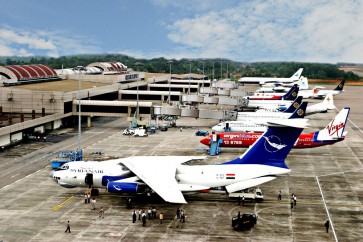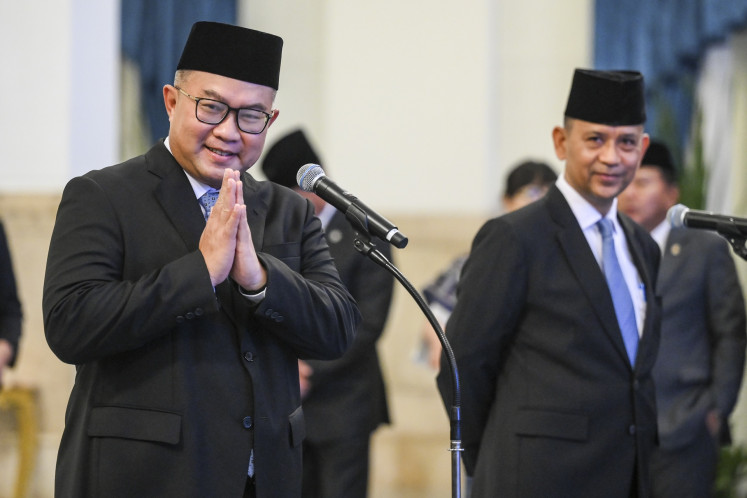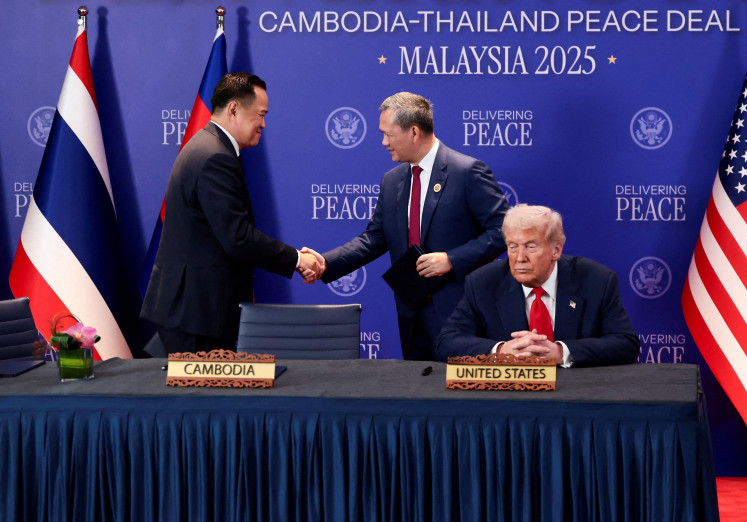Popular Reads
Top Results
Can't find what you're looking for?
View all search resultsPopular Reads
Top Results
Can't find what you're looking for?
View all search resultsTerrorists toying with the inconceivable
Counterterrorism officials may no longer relish the thought that the wane of terrorism networks will hamper a new breed from going the extra mile to do something inconceivable
Change text size
Gift Premium Articles
to Anyone
C
ounterterrorism officials may no longer relish the thought that the wane of terrorism networks will hamper a new breed from going the extra mile to do something inconceivable.
Terrorist groups and their supporters have recently tried to bribe the police to escape justice, establish alliances with drug syndicates to acquire financing for their next plot, and even hack foreign exchange (forex) websites to fund their radical organizations.
“And who knows what else they may have up their sleeves,” said the operations director of the National Counterterrorism Agency (BNPT), Brig. Gen. Petrus Reinhard Golose, recently.
He said terrorists had always found creative ways to operate after a crackdown by the authorities.
“Now they’re working in small and scattered groups. In terms of quantity, there are still a lot. But their capability in making bombs has been drastically weakened.”
“Although they’ve constantly evolved, they are actually from the same group [supporters of the outlawed Indonesian Islamic State, or NII, whose top leaders formed the now-defunct regional terrorist network Jamaah Islamiyah],” said Petrus, recently.
According to Petrus, the most alarming trend was the growing levels of religious radicalism that had aggressively lured supporters to pursue acts of terrorism, and accumulated new financing scheme through various methods.
Among the new methods are the use of drug syndicates for financing, and even launching an attack.
“Abu Hanif, for example, was a drug convict who was recruited by terrorist inmates while spending time in jail. There’s a possibility that some of the money for the operation was from drug businesses,” said Petrus.
Abu, along with four other terrorists, was shot dead during a raid in mid March in Bali.
“Fadli Sadama, who was involved in the robbery of Bank CIMB in Medan, had once smuggled amphetamines from Malaysia to finance terrorism,” said Petrus.
Eleven alleged terrorist, who were recently arrested in Bali had even accumulated wealth to the tune of Rp 8 billion (US$850,000) and a shop in Medan, North Sumatra, valued at Rp 4 billion, according to BNPT chairman Ins. Gen. (ret.) Ansyaad Mbai.
“During the arrest, one of them offered us on ‘86’ [a slang term within the police to end the prosecution in exchange for kickbacks]. It’s the first time a terrorist tried to bribe us. They’re rich,” said Ansyaad.
He said terrorists’ wealth had also come from hacking an international online forex business. “They somehow hacked the website and transferred euros into their bank accounts,” he said, adding that new networks had the capabilities to recruit talented IT workers.
Although terrorist networks have been drastically weakened, a number of localized and scattered supporters remain alive and well.
“There’s an escalation of training activities, but at smaller units with high mobility. This is particularly rampant in Sulawesi,” said Petrus.
In terms of coverage, the networks have been mostly operating regionally, with intense engagement with Malaysia and the Philippines, where the Moro Islamic Liberation Front (MILF) still provides shelter for Indonesian terrorism fugitives.
Another factor to watch, according to Petrus, is the continuing problem of terrorist recruitment within prisons. Unless no immediate measures are taken, he said, top terrorist leaders, who are currently behind bars, could maintain the loyalty of fellow terrorism convicts.
“Out of around 700 terrorist convicts, around 22 remained terrorists when they completed their [prison] terms. The percentage may be small, but it does not matter in terrorism, where they have a chance to become suicide bombers,” said Petrus.
The government’s plan to establish a special prison for terrorist convicts has run aground, thwarted by bureaucracy and a lack of support from politicians.
Indonesia, with the world’s largest Muslim population, has not seen a major terrorist attack since the bombing of the JW Marriott and Ritz-Carlton hotels in 2009 as many top terrorist leaders and bombmakers were either killed or captured in police raids.
University of Indonesia counterterrorism expert Andi Widjayanto said although terrorism supporters remained, they lacked the capability to consolidate a nationwide network as in the past.
“However, we should be aware of keeping Poso [Central Sulawesi] and Ambon [Maluku] safe from sectarian conflict that could be used to flame the spirit of jihad in other parts of the country,” he said.










